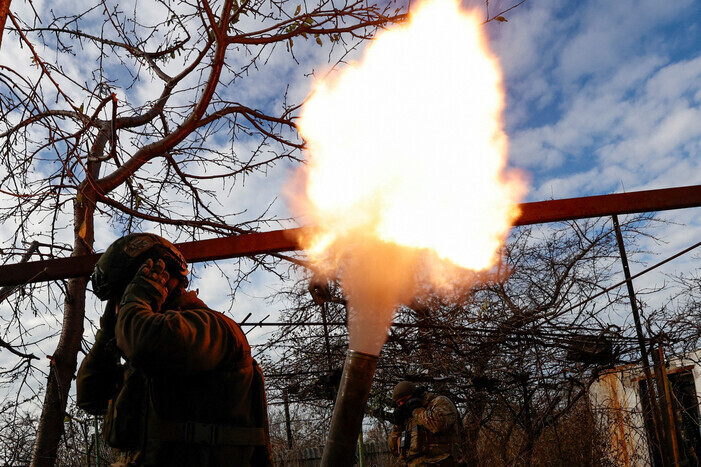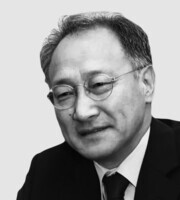hankyoreh
Links to other country sites 다른 나라 사이트 링크
[Guest essay] Preventing Korean Peninsula from becoming front line of new cold war


By Lee Sok-bae, former South Korean ambassador to Russia
After nearly half a year of waiting, a budget plan for US$61 billion in military aid to Ukraine was passed by the US Congress. The assistance appears likely to be forthcoming shortly.
While this may help the Ukrainian military in holding out longer as it finds itself having to defend against a series of attacks by Russian forces, the prevailing analysis is that this solution alone is not going to turn the tide of the conflict.
Despite Russia’s recent advances, neither side in the war has been able to achieve a breakthrough victory. It’s a situation where no potential for negotiation has yet been visible.
Ukrainian President Volodymyr Zelenskyy appears certain to choose a continuation of the conflict over negotiation as long as the West keeps providing military assistance to throw cold water on Russia’s optimism about its prospects in a long-term war.
Another element complicating the negotiations is the inability of the US and NATO to be proactive about guaranteeing the security of Ukraine, which faces constant border concerns due to its discord with Russia. The position of the two sides’ leaders, who cannot afford to make any concessions on territorial matters without risking political suicide, is another factor suggesting the war will continue to drag out.
It appears likely that South Korea-Russia relations will remain rocky as long as the war in Ukraine goes on. Trying to manage ties with Moscow while also coordinating with the US and NATO has about the same degree of difficulty as trying to thread a needle in a car driving on a cobblestone road.
In addition to its diplomatic achievements in terms of beefing up the extended deterrence-centered alliance with the US and trilateral coordination with the US and Japan, the Yoon Suk-yeol administration has clearly established South Korea as a prominent, responsible member of the forces of liberal democracy, as seen with his active participation in the NATO Asia-Pacific partners framework, alongside Japan, Australia and New Zealand.
But the reality of South Korean diplomacy is such that one cannot help recalling the observation of onetime US Secretary of State James Baker, who said that all diplomatic achievements carry with them the seeds of future problems.
It appears undeniable that the current military closeness between Russia and North Korea has been motivated by Moscow’s difficult situation and its urgent need for weapons support from Pyongyang.
Yet there is another aspect to this military cooperation. With its leading roles in frameworks like AUKUS (a military alliance of the US, the UK and Australia), the Quad (the US, Japan, India and Australia), and NATO and its partners in the Pacific, the US is perceived by Russia to be working to establish a new security bloc in the Asia-Pacific region. Russia sees cooperation with North Korea as a way of countering the US’ strategy of expansion.
Meanwhile, the US-Japan summit in April clearly showed the evolution that is taking place with US alliance structures in the Indo-Pacific region. South Korea will inevitably find itself part of that process, which is likely to carry greater US expectations and demands for it to play a role.
With Seoul having to contend with the reality of Pyongyang remaining our No. 1 security threat, as well as concerns about coordination between North Korea, China and Russia, it will become increasingly difficult to follow the demands that emerge from the alliance with the US.
Amid the ongoing heated antagonisms between South and North Korea, the US’ efforts to reorganize its alliance structures and Russia’s harsh response to them have raised concerns over the possibility of a new Indo-Pacific cold war boundary being drawn on the peninsula.
Following NATO’s eastward expansion with Germany’s reunification in 1990, Europe’s boundary shifted from the German border to those of Poland and Ukraine. It’s no coincidence that Ukraine — which is located on the boundary between NATO and Russia — is experiencing such a grim situation.
This is also the reason that South Korea needs to be judicious about handling its relationship with Russia even as it strengthens its alliance with the US and its coordination with the US and Japan.
Within South Korea, there has been a growing hard-line attitude toward Russia amid its closeness with North Korea, and particularly in the wake of its move last March to veto a resolution that would have extended the term of a panel of experts under the UN Security Council Sanctions Committee on North Korea. Some have even argued that Seoul no longer has any cause for hesitating to provide Ukraine with lethal weapons.
This inflammatory stance on Russia could be seen as a natural outcome of the perception that in spite of the considerable commitment that South Korea has shown to managing relations with Russia — for example, by adhering to its position of not providing Ukraine with lethal weapons even under pressure from the US, NATO and other Western powers — Russia has not responded favorably and is instead continuing to test South Korea’s patience.
Seoul’s reasons for providing lethal weapons to Ukraine, or for hinting to Russia that it intends to, would be to induce a change in Russia’s behavior. But the expectation that a hard line would lead Moscow to alter its approach is not just unrealistic — it is downright dangerous.
If South Korea does adopt a harder line, Russia’s response will not be to change, but to defy it in very aggressive ways. We should not rush to play the “hard line” card when our diplomatic options have not yet been exhausted.
In the absence of effective measures for managing ties with Russia, a solution may be found in Washington rather than Moscow. There may be a textural difference between how the US views its global strategy and the density of tensions we experience on the Korean Peninsula.
We need to get the US to understand more clearly our urgent security situation, where we could easily end up lost amid its global strategy, and we need to clarify exactly what we can and cannot do. Whatever latitude we gain in the process will be our diplomatic room for maneuvering when it comes to managing our relationship with Russia.
South Korea is in a tough situation where it has to factorize a very complex diplomatic equation. Leo von Caprivi, the chancellor of the German Empire, admitted to lacking Otto von Bismarck’s ability to “juggle five balls at once.” He ended up leading Germany into the calamity of the First World War.
I look forward to seeing South Korea’s foreign affairs officials show some advanced diplomatic acumen.
Please direct questions or comments to [english@hani.co.kr]

Editorial・opinion
![[Editorial] Intensifying US-China rivalry means Seoul must address uncertainty with Beijing sooner than later [Editorial] Intensifying US-China rivalry means Seoul must address uncertainty with Beijing sooner than later](https://flexible.img.hani.co.kr/flexible/normal/500/300/imgdb/original/2024/0517/8117159322045222.jpg) [Editorial] Intensifying US-China rivalry means Seoul must address uncertainty with Beijing sooner than later
[Editorial] Intensifying US-China rivalry means Seoul must address uncertainty with Beijing sooner than later![[Column] When ‘fairness’ means hate and violence [Column] When ‘fairness’ means hate and violence](https://flexible.img.hani.co.kr/flexible/normal/500/300/imgdb/original/2024/0516/7417158465908824.jpg) [Column] When ‘fairness’ means hate and violence
[Column] When ‘fairness’ means hate and violence- [Editorial] Yoon must stop abusing authority to shield himself from investigation
- [Column] US troop withdrawal from Korea could be the Acheson Line all over
- [Column] How to win back readers who’ve turned to YouTube for news
- [Column] Welcome to the president’s pity party
- [Editorial] Korea must respond firmly to Japan’s attempt to usurp Line
- [Editorial] Transfers of prosecutors investigating Korea’s first lady send chilling message
- [Column] Will Seoul’s ties with Moscow really recover on their own?
- [Column] Samsung’s ‘lost decade’ and Lee Jae-yong’s mismatched chopsticks
Most viewed articles
- 1For new generation of Chinese artists, discontent is disobedience
- 2[Column] US troop withdrawal from Korea could be the Acheson Line all over
- 3[Editorial] Transfers of prosecutors investigating Korea’s first lady send chilling message
- 4[Column] When ‘fairness’ means hate and violence
- 5Xi, Putin ‘oppose acts of military intimidation’ against N. Korea by US in joint statement
- 6[Exclusive] Unearthed memo suggests Gwangju Uprising missing may have been cremated
- 7China calls US tariffs ‘madness,’ warns of full-on trade conflict
- 8[Editorial] Intensifying US-China rivalry means Seoul must address uncertainty with Beijing sooner t
- 9S. Korea “monitoring developments” after report of secret Chinese police station in Seoul
- 10For Korea’s Justice Ministry, no place is sacred from immigration raids